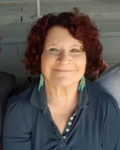
Muriel is a devoted mother who enjoys painting and photography. When she visited her doctor after noticing symptoms and received a diagnosis of uterine cancer, she experienced a variety of emotions. “Fear and anxiety and desperation because who do you turn to and how do you proceed after the diagnosis?”
The treatment plan included surgery and radiation administered through brachytherapy, which was invasive and uncomfortable. Muriel found ways to cope with the physical challenges of treatment by thinking about the important people in her life. “I decided I had to do every treatment I needed to do because I wanted to extend my life.”
Cancer diagnosis and treatment led to mental challenges, including difficulty continuing to pursue her creative passions. “I couldn’t be creative,” Muriel shared. “You’re in survival mode. You have to take care of yourself and you have to let other things go because you can’t do both.”
Research and open communication with her health care team helped Muriel stay informed about her treatment. “I try to ask a lot of questions. I try to be informed. Before I go to the doctor, I have a list of questions so I don’t forget anything.”
Drawing from previous personal and professional experiences with advocacy was also useful. “I’ve always done advocacy in different levels and then when I got the cancer diagnosis, I went right into that advocating mode and researched everything – diagnosis, grade, support groups.”
As a result of her research, Muriel found out about CancerCare’s services and programs. She found it helpful to connect with like-minded communities in spaces that weren’t just focused on cancer, including its book club, movie club and journaling support group.
It was also important to receive guidance from others experiencing similar challenges. “When you go to support groups from CancerCare, women have gone through different scenarios and sometimes you can learn through them a different medication or a way to treat neuropathy.”
Muriel also got connected to other resources from CancerCare, including transportation grants and individual counseling with an oncology social worker specializing in supporting people affected by cancer. “It was good to have somebody in my corner to help me get through those times.”
One of Muriel’s strengths is perseverance, which helped her manage balancing cancer treatment with the responsibilities of caring for her youngest son. “Even when I was in the cancer journey, I didn’t have time to sit down and dwell on things because I had to go shopping. I had to run around.”
She also found strength by seeking out restorative experiences through family trips, a free retreat for patients with cancer and taking time for herself. “Right after radiation, I was lucky with no side effects,” Muriel shared. “I took myself and went away to an Airbnb for a few days because I had to recharge and regroup.”
Recently, Muriel has been able to focus more on creative activities as she feels more stable. “I’m having a photographic exhibit at my local library of my photos from Brooklyn. It’s interesting how to the fog lifts eventually.”
For those facing a cancer diagnosis, Muriel suggests finding support from other people with similar experiences. “Realize that you’re not alone,” she said. “There are a lot of us out there who are going through similar things and you may get advice that can help you.”
